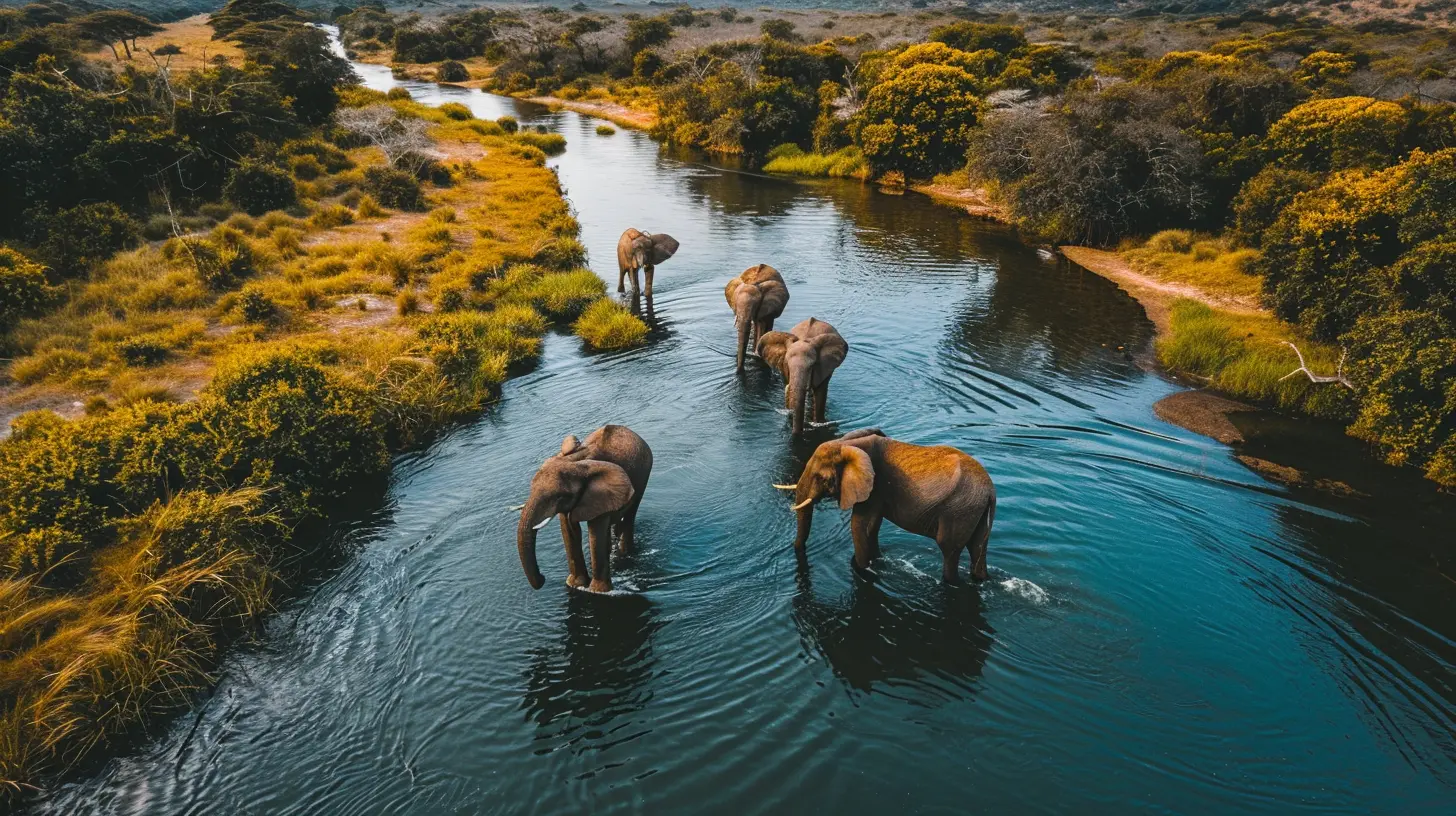A Guide to Responsible and Ethical African Safari Tours
23 September 2025
Picture this: you're watching the sun rise over the African savannah, the sky painted with hues of orange and pink. In the distance, a herd of elephants calmly munches on acacia branches, while a pride of lions lounges in the shade. It’s not just an adventure; it’s a glimpse into the wild, untamed beauty of Africa. But as captivating as an African safari may sound, have you ever stopped to think about the impact your visit might have on the environment and local communities?
The notion of responsible and ethical tourism has gained traction in recent years. And with safaris being one of the top travel experiences in Africa, it’s more important than ever to ensure these tours benefit the environment, its wildlife, and the people who call these stunning landscapes home.
In this guide, we’ll walk you through how to embark on African safari tours with a responsible and ethical mindset. We’ll dive deeper into what responsible tourism really means, why it’s essential, and how you can be part of the solution while still having the trip of a lifetime.

What Does It Mean to Be a Responsible Traveler?
First, let's break down what we mean by “responsible tourism.” In short, responsible travel is about minimizing the negative impacts of tourism on the environment, cultures, and wildlife, while maximizing the positive benefits. This concept goes hand-in-hand with being an ethical traveler, which involves making moral and sustainable choices that protect the well-being of the planet and its inhabitants.But how does this translate to an African safari?
Well, it means choosing tours, lodges, and operators who prioritize conservation efforts, support local communities, and ensure the natural habitats of animals remain minimally disrupted. It’s about asking yourself: "Am I leaving a positive footprint?" or "Am I helping preserve the wildlife I’m so eager to witness?"

Why Should You Care About Ethical African Safaris?
You might be wondering, “Does it really make a difference if I take an ethical safari tour?” The answer is a resounding yes. Here's why:1. Wildlife Conservation: Africa’s wildlife is under constant threat from poaching, habitat destruction, and human-wildlife conflict. Booking with responsible safari operators supports conservation projects that protect endangered species and their habitats.
2. Support Local Communities: Ethical tourism ensures that local communities benefit from tourism, not just big corporations. This could mean anything from job creation to supporting local businesses, schools, and health care initiatives.
3. Sustainability: Responsible tourism reduces your environmental footprint. Safari companies making eco-conscious decisions help preserve ecosystems for future generations to enjoy.
4. Cultural Exchange: When done right, safaris offer a platform for cultural exchange where you can learn about local customs, rather than exploiting them. You get to truly connect with the essence of Africa beyond the wildlife.

Animal Welfare: The Heart of Ethical Safaris
The Dark Side of Unethical Safaris
At the core of responsible safari tours is the treatment of animals. Let’s face it – most of us are excited to see African wildlife up close, but some tourism activities exploit animals in heartbreaking ways.Take, for example, the allure of seeing animals in confined spaces, such as "walking with lions" or petting young cubs. What many people don’t realize is that these animals are often drugged or bred in captivity, only to be later sold to hunting industries or kept in inhumane conditions. It’s rough to swallow, but many unethical safari operations prioritize profits over the welfare of wildlife.
What Should You Look For?
When booking a safari, seek out companies that promote ethical wildlife interactions. True wildlife experiences should keep animals in the wild, free from human interference. Opt for tours where animals are observed from a safe (and respectful) distance in their natural habitats, without contrived encounters.Most reputable safari operators will be more than happy to answer your questions about their conservation practices, so don’t be shy to ask! Here are a few red flags to avoid:
- Tours that offer hands-on animal interactions, such as feeding or petting.
- Captive breeding programs that do not have a clear conservation purpose.
- Operators that allow hunting of animals or work with canned hunting facilities.

Choosing Eco-Friendly Safari Lodges
Believe it or not, where you stay during your safari can have a huge impact on the environment. With the rise in eco-conscious travelers, many lodges and camps across Africa now adopt green practices to minimize their impact on the land.Features of Sustainable Safari Lodges
Here are a few things to look out for when choosing an eco-friendly safari lodge:- Solar Power: Many lodges use solar panels to generate electricity. Not only does this reduce their carbon footprint, but it also preserves the pristine environments in which these lodges are located.
- Water Conservation: Water shortages are common in many African regions. Look for lodges and camps that practice water-saving initiatives, such as rainwater harvesting or greywater recycling.
- Waste Management: A good eco-lodge will have measures in place to minimize waste, including composting and proper recycling programs.
- Low-Impact Architecture: Some lodges are built in harmony with the landscape, using sustainable materials and designs that blend in with their surroundings, helping to minimize habitat disruption.
By staying at eco-friendly lodges, you not only reduce your environmental footprint but also support sustainable tourism initiatives that protect local wildlife and landscapes.
Supporting Local Communities
Why It Matters
When you embark on a safari, it isn’t just about the animals; it’s also about the people who live near these wildlife conservation areas. Traditional safari tourism can sometimes be too focused on profits, with little investment in local communities.However, responsible safari operators prioritize giving back to the people. This might include providing jobs, offering educational and vocational training, or funding community development projects that improve healthcare and infrastructure.
In Africa, community-based tourism is incredibly powerful because it helps local people gain economic benefits from tourism while also preserving their cultural heritage.
How You Can Contribute
When planning your safari, aim to support tour operators who collaborate with local communities. You can also make a difference by:- Buying Local: Purchase souvenirs, handicrafts, and services from local artisans and vendors. This keeps the money circulating within the community.
- Tipping Fairly: Many guides, porters, and service workers rely on tips as part of their income. A small tip can go a long way in supporting local livelihoods.
- Participating in Cultural Experiences: Many safari operators offer opportunities to visit local villages and learn about their customs. When done ethically, this can be a form of positive cultural exchange that helps preserve traditions.
Leave No Trace: Safari Etiquette for Responsible Travelers
1. Respect Wildlife Boundaries
While it’s thrilling to get close to animals, always remember: you're a guest in their home. Stick to a respectful distance (your guide will know what's appropriate) and never interfere with an animal’s natural behavior. That means no feeding or shouting to get an animal’s attention – it’s not a zoo!2. Stick to Designated Tracks
Straying from designated paths may seem like a harmless adventure, but it can damage fragile ecosystems. Safari vehicles can crush nests, plants, or disturb animals, so it’s important to stay on the marked tracks at all times.3. Be Mindful of Your Waste
If you bring snacks or plastic items, make sure you take all your trash with you. Safari parks might not always have waste disposal systems, and litter can harm wildlife.4. Patronize Ethical Operators
Do your homework before booking your safari tour. Look for operators who are committed to conservation, animal welfare, and community development. There are tons of great companies out there that are making a difference – and by choosing them, you can too.Wrapping Up: Enjoying Safaris the Ethical Way
An African safari is, without a doubt, a soul-enriching experience. From the expansive landscapes to the fascinating wildlife, it offers nature in its rawest, most awe-inspiring form. But with great experiences comes great responsibility, and it’s up to us to ensure the tourism industry in African safari destinations grows in the right direction – one that’s rooted in respect for nature, animals, and people.By making ethical choices when planning your safari adventure, you're not only safeguarding the future of Africa’s magnificent wildlife but also uplifting local communities. And trust me, when you’re in the heat of the moment – with herds of zebras galloping across the savannah or elephants tossing dirt to cool themselves – knowing you did it right will make the experience all the more exhilarating.
all images in this post were generated using AI tools
Category:
Africa TravelAuthor:

Ian Powell
Discussion
rate this article
1 comments
Sara Hayes
What a beautifully written guide! It’s essential to prioritize responsible tourism in Africa. Your insights inspire a deeper appreciation for wildlife and local communities. Thank you for highlighting these important practices!
September 24, 2025 at 4:53 AM

Ian Powell
Thank you so much for your kind words! I'm glad you found the guide inspiring and important. Responsible tourism is vital for preserving Africa's wildlife and supporting local communities.


